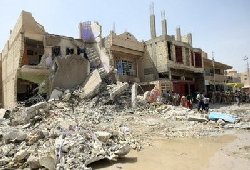At least eight explosions have rocked the Iraqi capital, killing at least 35 people and injuring more than 140 people.
The blasts targeted residential buildings in a mix of Sunni and Shia areas of Baghdad on Tuesday morning.
Police said two car bombs were detonated in Chkook, Khadamiya district, killing at least five people.
In Baghad's western Shula district, another car bomb exploded, causing some buildings to collapse. Several people died in the explosion, Iraqi security sources said.
Al Jazeera's Zeina Khodr, reporting from Baghdad, said those attacks occurred in residential neighborhoods of the capital.
"[Shula] is a mostly Shia neighborhood. It used to be a former stronghold of the Mahdi Army, the armed wing of the Sadr movement," our correspondent said, referring to supporters of Moqtada al-Sadr, a Shia leader.
Target not clear
Shula has been a relatively quiet neighborhood, having not seen been the target of attacks in recent months.
Police said another of the blasts was carried out by a bomber, who detonated explosives on Haifa street in the central Salhiya neighborhood, near the national museum.
Our correspondent said it was not yet clear what the target of that attack was.
"We're getting conflicting reports on the target. Some reports say it was the public works ministry, other reports say he [attacker] blew himself up outside a popular restaurant," she said.
Iyad Allawi, the former prime minister whose coalition won a narrow victory in the country's March 7 poll, sharply criticized the attacks.
"Government officials hold responsibility for not achieving security," Allawi said as he gave blood for the wounded in Baghdad.
"I don't know what they have been doing in these (last) four years."
"They have been saying 'we are ready,'" Allawi said. "Where is this readiness? Nothing is ready."
Political unrest
This coordinated strike follows similar attacks just three days earlier. On Sunday, three suicide car bombs near foreign diplomatic missions killed at least 30 people and wounded hundreds more.
In the past five days, four attacks have left more than 100 people dead.
The spate of violent attacks comes as Iraqi politicians continue wrangling to form a coalition government following last month's general elections.
The Sadr political bloc was expected to announce who it would back for prime minister on Tuesday after holding an unofficial referendum among its supporters, but said late on Monday night that the decision was being postponed.
Nouri al-Maliki, the incumbent prime minister, is reported to have met the group last night, but no details of any agreement have emerged. The Sadr bloc has in the past indicated it would not support al-Maliki staying on for another term as prime minister.
Our correspondent in Baghdad said a lot of negotiations are taking place, but "no agreements so far, no progress, and there is a real fear that the security situation will deteriorate".
"Over the past few days we've been seeing car bombings, shootings, mortar round being fired, as well as improvised explosive device attacks".
PHOTO CAPTION
A general view shows destruction in the western Baghdad district of Shukuk which was hit by one of six blasts that rocked the Iraqi capital.
Al-Jazeera


 Home
Home Discover Islam
Discover Islam Quran Recitations
Quran Recitations Lectures
Lectures
 Fatwa
Fatwa Articles
Articles Fiqh
Fiqh E-Books
E-Books Boys & Girls
Boys & Girls  Ramadan
Ramadan Fatwa Audios
Fatwa Audios Month of Mercy
Month of Mercy Women
Women Eed Al- Fitr
Eed Al- Fitr Food Recipes
Food Recipes Videos
Videos

 Prayer Times
Prayer Times












